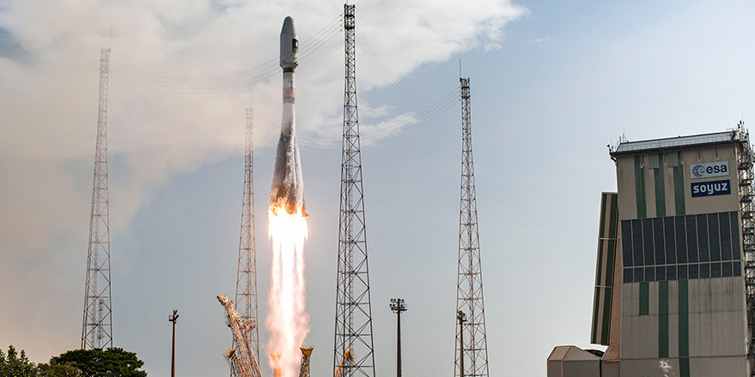CHEOPS will ride on a Soyuz rocket
April 7th, 2017

[fusion_builder_container hundred_percent="yes" overflow="visible"][fusion_builder_row][fusion_builder_column type="1_1" background_position="left top" background_color="" border_size="" border_color="" border_style="solid" spacing="yes" background_image="" background_repeat="no-repeat" padding="" margin_top="0px" margin_bottom="0px" class="" id="" animation_type="" animation_speed="0.3" animation_direction="left" hide_on_mobile="no" center_content="no" min_height="none"][caption id="attachment_8021" align="alignright" width="318"] Cheops will be launched on a Soyuz from Europe’s Spaceport in Kourou, French Guiana. The image shows the first Soyuz launch from Kourou, in 2011. (Credit: ESA/CNES/ARIANESPACE/Optique Video Du CSG)[/caption] Now it is clear: the space telescope CHEOPS - CHaracterising ExOPlanet Satellite - will be launched with a Soyuz rocket from Europe’s spaceport in Kourou in French Guyana. The European Space Agency (ESA) has announced the decision today Thursday, 6 April 2017 The exact launch date remains to be confirmed. It is clear, however, that CHEOPS is expected with all testing completed and ready by the end of 2018. At the University of Berne, the engineers are already working to finish the telescope. After assembly, CHEOPS is transported to Kourou. Arianespace is responsible for the launch. CHEOPS will be shot into an earth orbit along with another payload. Shortly after the ascent phase, the two satellites will be separated and transported to their own orbits. CHEOPS orbits the earth at an altitude of 700 kilometers. As it circles the globe from pole to pole, the satellite will ride the terminator between day and night such that it will always be directly above sunrise or sunset. Through high-precision monitoring of a star’s brightness, scientists will examine the transit of a planet as it passes briefly across the star’s face. This allows the radius of the planet to be accurately measured. For those planets of known mass, the density will be revealed, providing an indication of the structure. These key features will help us to understand the formation of planets in the Earth-to-Neptune mass range. The mission will also contribute to ideas about how planets change orbits during their formation and evolution. CHEOPS will also identify targets for habitability studies using future ground- and space-based telescopes, including the international James Webb Space Telescope being launched next year. CHEOPS is the first ESA space mission, under Swiss management. The mission important contributions from 10 other member states.[/fusion_builder_column][/fusion_builder_row][/fusion_builder_container]
Cheops will be launched on a Soyuz from Europe’s Spaceport in Kourou, French Guiana. The image shows the first Soyuz launch from Kourou, in 2011. (Credit: ESA/CNES/ARIANESPACE/Optique Video Du CSG)[/caption] Now it is clear: the space telescope CHEOPS - CHaracterising ExOPlanet Satellite - will be launched with a Soyuz rocket from Europe’s spaceport in Kourou in French Guyana. The European Space Agency (ESA) has announced the decision today Thursday, 6 April 2017 The exact launch date remains to be confirmed. It is clear, however, that CHEOPS is expected with all testing completed and ready by the end of 2018. At the University of Berne, the engineers are already working to finish the telescope. After assembly, CHEOPS is transported to Kourou. Arianespace is responsible for the launch. CHEOPS will be shot into an earth orbit along with another payload. Shortly after the ascent phase, the two satellites will be separated and transported to their own orbits. CHEOPS orbits the earth at an altitude of 700 kilometers. As it circles the globe from pole to pole, the satellite will ride the terminator between day and night such that it will always be directly above sunrise or sunset. Through high-precision monitoring of a star’s brightness, scientists will examine the transit of a planet as it passes briefly across the star’s face. This allows the radius of the planet to be accurately measured. For those planets of known mass, the density will be revealed, providing an indication of the structure. These key features will help us to understand the formation of planets in the Earth-to-Neptune mass range. The mission will also contribute to ideas about how planets change orbits during their formation and evolution. CHEOPS will also identify targets for habitability studies using future ground- and space-based telescopes, including the international James Webb Space Telescope being launched next year. CHEOPS is the first ESA space mission, under Swiss management. The mission important contributions from 10 other member states.[/fusion_builder_column][/fusion_builder_row][/fusion_builder_container]